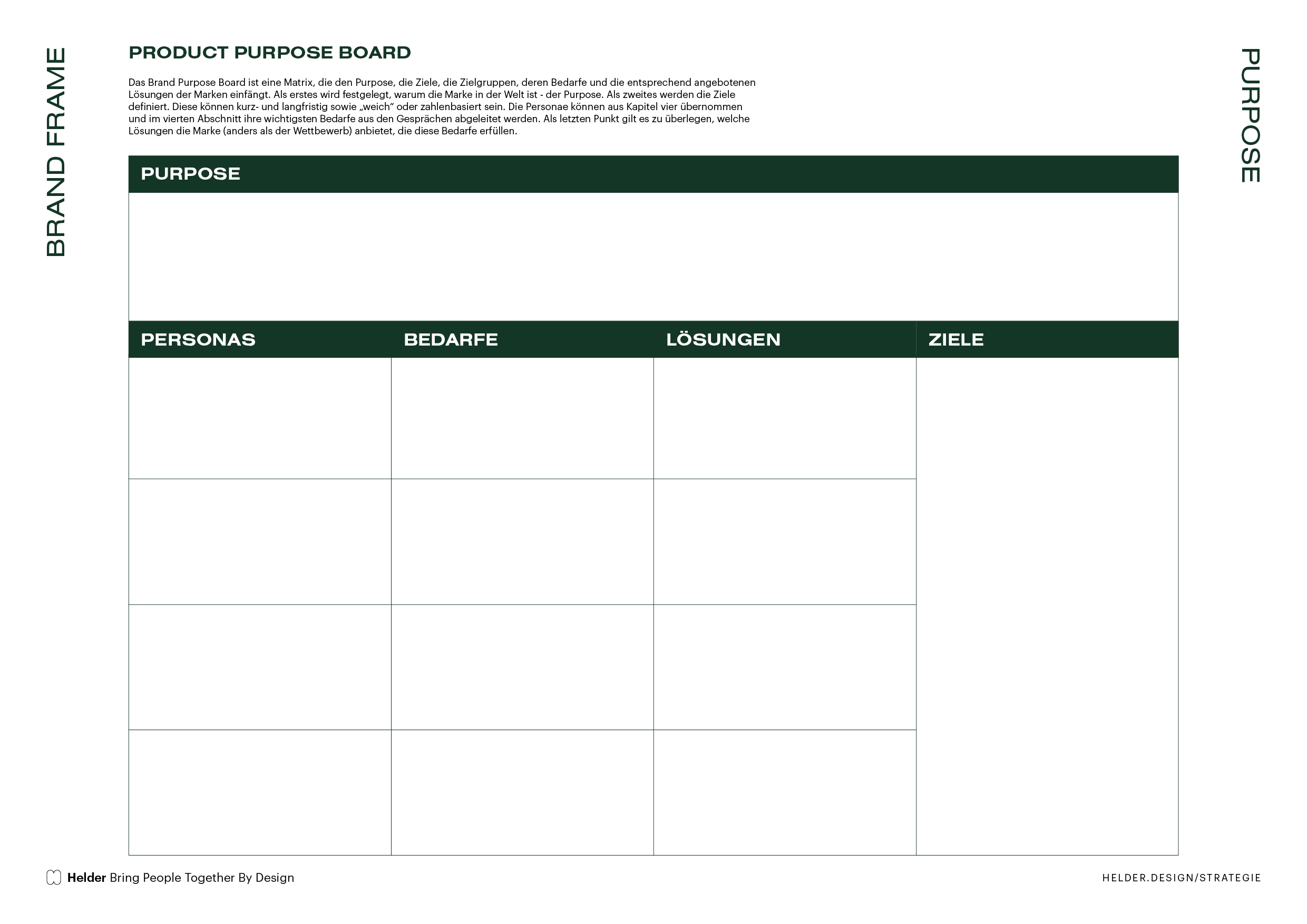Table of contents
Brand purpose definition
Brand purpose or corporate purpose is the key term in the current discourse on the raison d’être of brands. Purpose describes a company’s raison d’être beyond pure profit maximization.
Purpose does not refer to corporate social responsibility. Rather, purpose describes the business ethics of a company: purpose describes the added value in the local environment, in the region or in the global market environment that companies create with their value creation activities. In this respect, the current purpose discourse is nothing new, but has references to a corporate responsibility that has been enshrined in the German Basic Law for 75 years now: Ownership is an obligation. At the same time, its use should serve the common good.
Why is a brand purpose important?
In affluent and knowledge-based societies, it is futile to differentiate oneself solely on the basis of quality or even value for money. Numerous purchases no longer cover basic needs, but fulfill desires, and this with an almost unmanageable selection of very similar goods and services. In order to assert oneself on the market in the face of enormous competitive pressure and unprecedented media transparency, brands must not be interchangeable or replaceable, but must be authentic, relevant and distinguishable. This applies once again with regard to the internal employee market.

“Well, Mr. President, I’m helping put a man on the moon.”
The answer of a space attendant to the question of then US President John F. Kennedy about his job at the NASA space center
This is all the more true at a time when not only millennials, but people of all ages and social classes are asking themselves the question of meaning – also due to the crisis. Brands must therefore take a stand – not only in their own market, but also in the world; as service providers, producers and employers. Pure profit maximization can no longer be the sole purpose of a future-oriented company. Brands that want to be relevant must have a higher meaning: a purpose.
WHY DETERMINES ENTREPRENEURIAL ACTION
Golden Circle Template
Brand purpose as an essential component of brand identity
The example of Dove shows how essential brand purpose is for the success of brands. When the first “Campaign for Real Beauty” was launched in 2004, everyone was talking about it. Dove breaks with beauty taboos and manages to increase the self-esteem of people, especially women, within its target group. Dove is building a strong brand with communication that is aligned with a purpose. The result: the brand is estimated to be worth USD 6.47 million in 2023.
Define brand purpose: Process
The formula for purpose is simple: profit-oriented activity + social benefit = purpose. Finding a purpose is admittedly easier in some industries than in others: it is important to identify a credible added value for the brand.brainstorm together: Why is the brand in the world with its performance? Attention: “Making money” is not the answer here! Claiming a purpose for purely strategic marketing purposes will miss the mark. People have an excellent sense of whether an attitude is sincere – or not. A contrived purpose can disappoint, demotivate, even embarrass and therefore damage the brand.

Download Brand Purpose Template
Brand purpose – 3 examples of success
A brand purpose can be relevant not only for brands from socially or ecologically oriented sectors, but in principle for any company. This is shown by the following examples.

A strong purpose gives Nike access to a broad target group
Brand Purpose example: Nike – Breaking Barriers
“Nike exists to bring inspiration and innovation to every athlete* in the world. Our Purpose is to move the world forward through the power of sport – breaking barriers and building community to change the game for all. *If you have a body, you are an athlete.” To fulfill its purpose, Nike invests in three areas: People, Planet, Play. This includes programs such as community building, diversity in its own workforce, recycling, promoting physical activity for children and much more. It is no coincidence that the brand is once again ranked among the top 25 in 2021 with a brand value of almost 84 billion US dollars. The strong purpose makes the sneaker a statement.

einhorn is a purpose-driven company: Fairness and sustainability determine all company activities
Brand Purpose example: unicorn condoms – Unfuck the economy
“Climate change, poverty, disease, groundwater pollution and the widening gap between rich and poor are just some of the challenges facing our world today. We want to take responsibility and believe that companies should not be part of the problem but part of the solution. We also want to make the whole thing sexy.” einhorn Kondome describes itself as a purpose-driven company. The start-up was founded in 2015 to produce fair, sustainable and vegan condoms with a branding and packaging design that goes beyond the usual drugstore aesthetic. The purpose of fairstainability (fairness + sustainability) is decisive for all company activities: from the transparent value chain for condoms and period products to the investment of profit shares in charitable projects and responsible ownership as an alternative ownership model. In the case of einhorn, this means, among other things, that the company’s voting rights are always held by employees and that shares in the company cannot be inherited. Fairstainability thus becomes the legal basis for brand management.
Purpose Example: Gillette – The Best Men Can Be
„We will provide branded products and services of superior quality and value that improve the lives of the world’s consumers, now and for generations to come.“
“The Best Men Can Be”, one of several campaigns with which Gillette takes account of the rather awkwardly formulated brand purpose, was the subject of much controversy: the campaign propagates a new image of men that goes beyond traditional stereotypes and is intended to serve as a role model for future generations. It was inevitable that some of the target group would feel offended by the portrayal of supposedly “typically male” behavior. The example shows that living a purpose means consistency. Gillette seems less concerned about losing customers with a certain mindset than about changing the narrative about men’s traditional patterns or even predispositions.
Those with a purpose are more productive
Start-ups such as einhorn, but also larger, established companies such as Zeiss, show that it is possible to align corporate strategy with a sense of purpose and be successful and profitable in the process. Studies have shown that purpose is not limited to altruistic striving, and that brands that align their actions with their purpose are demonstrably more successful, both in terms of overall performance and customer orientation, sales and new customer acquisition, as well as innovative strength and digital transformation
Lange Stunden für ein Unternehmen zu arbeiten ist schwer. Lange Stunden für eine Sache zu arbeiten, ist einfach.
Elon Musk
Difference between purpose, vision and mission
At first glance, it is not easy to clearly distinguish between brand purpose, vision and mission. On closer inspection, however, they form a hierarchy, with purpose at the top level, hovering above things, so to speak. It answers the question of why the company is in the world. Accordingly, to a certain extent, it is also aimed at the whole world, namely all of the brand’s interest groups, both internal and external. The brand vision describes the company’s longer-term goal, e.g. a positioning or reputation to be achieved. It is primarily aimed at employees and serves as motivation and orientation. The mission summarizes the brand’s specific services in terms of a value proposition and is therefore primarily aimed at customers.
| Purpose | Mission | Vision | |
| Content | The brand’s justification for existence: What does the company contribute to society? | Concrete benefit of business activities, products, services | Future positioning of the brand |
| Target group | All stakeholders | Customers | Employees |
| Alignment | internal and external | Rather external | Rather internal |
| Classification | Fundamental overriding objective | Short-term goal | Long-term goal |
Brand purpose, vision and mission should naturally relate to each other or stand in relation to each other. Then they unfold their power as a veritable entrepreneurial coordinate system.
Purpose first, strategy second
Formulating a brand purpose for purely strategic marketing purposes without living it will fail to have the desired effect. People have an excellent sense of whether a message or attitude is sincere – or not. This applies to potential buyers as well as employees. A promise that turns out to be vapid lip service can be disappointing, demotivating, even embarrassing and therefore extremely damaging for the brand, and the aforementioned media transparency contributes to Potemkin villages being quickly exposed as such. The purpose should therefore always be the driving force behind the brand strategy, not the other way around.
Brand Purpose FAQ
What is brand purpose?
The brand purpose describes the reason why a company is in the world, beyond pure profit orientation. The brand purpose encompasses the social added value that is intended to contribute to the common good.
Why is brand purpose important?
Brand purpose makes brands relevant. People are increasingly asking themselves the question of purpose and incorporating it into their decisions, whether as employees or customers. With a purpose, you take a stand and differentiate yourself from brands that only maximize profits.
How do you define the brand purpose?
A brand purpose should be sincere and authentic and serves as a driving force for the brand strategy. The starting point is the added value that is generated through value creation in society and that can also be lived.
What is the difference between brand vision and brand purpose?
The brand vision describes the company’s long-term goal, is primarily aimed at employees and serves as motivation. The purpose answers the question of why the company is in the world and is aimed at all interest groups.
How do you formulate a brand purpose?
The brand purpose is aimed at the whole world – at all interest groups. The aim is to formulate a promise that hovers at the highest level of entrepreneurial activity. Purpose statements should not be made up, but should arise from a sincere attitude.
Zweckbestimmung vs. soziale Verantwortung der Unternehmen?
Purpose describes the business ethics of a company: it is the promise to create added value in the local environment or in the global market environment, while corporate social responsibility refers to a company’s ecological and social responsibilities.
Our brand strategy expertise
Brand purpose is in the DNA of the brand
… most of the time anyway. That’s the good news: there is no need for “made-up” purpose statements. Nor is it necessary to over-stage your own raison d’être – not every brand can and must save the world. As brand consultants, we are convinced that (almost) every brand has an authentic, individual brand purpose that can be lived within the company. In our Brand Workshop, we bring this to light in a co-creative way with our clients.
Searching for meaning? Look no further – get in touch.